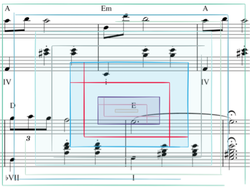I Don't Care What Happens Next
on the spiritual state of the world, the implications and utility of love, the definition and methodology of enlightenment
 The best musicians that I know seem to have this way of writing music and lyrics that don’t quite seem to match up. While you’re rocking out to their catchy, upbeat style, you begin to pay attention to what they’re saying . . . and it doesn’t quite fit your expectations. This whole time you assumed this was some party song about love or success or money or something else (mock-)superficial, but they’re belting their stories of heartbreak or misery. How does that make sense? But that’s exactly why they’re the best musicians that I know. Not simply because they defy expectations, which is often a mere parlor trick, but because within this apparent contradiction lies a strong and misunderstood truth: all of life is beautiful. Every story, whether one of breaking or one of healing, is a source of joy. Even life’s darkest moments—depression, fear, loss—are a reason for celebration! And these songwriters understand that. They know that, while they could write hundreds of sad, slow songs about their wounded souls, it is far more powerful to weave something stable through this seemingly painful tale. Their stories are bolstered both in effect and in validity by the indescribably stabilizing honesty of trust. They trust in the workings of the world, and they know that the good, the bad, and the in-between are all just pieces of life, a life that they cherish and honor. This type of songwriting is an homage to the oneness of being. These musicians respect themselves, us, and reality itself. They realize that it is far safer to have faith than to cling to fear or regret. This ties nicely into the idea of non-judgement, which is basically just a refusal to label your life's events. When something happens in your life, it's a strong habit to interpret it as a "bad" thing or a "good" thing. While this is certainly a pervasive convention, it can actually be rather self-destructive! For instance, when we experience something "bad", we may find this a very good excuse to feel "bad". Okay, so we just avoid the "bad" stuff and try only to encounter "good" stuff, right? Well, there's a problem there, too. Namely, when something "good" happens to us, it invariably comes with a price: it's always temporary. And, because we're aware of this, even the most perfect moment can be tinged with fear—the fear of the comparatively "bad" stuff that is inevitably to come. There is hope, though, for relief from this imbalance. It's in those paradoxical songs. It's in those brief moments when you simply forget to think or decide or label. It's in every spiritual teaching and every philosophical tome. It's the act (or, perhaps, the non-act) of non-judgement. All you have to do is refrain from calling the thing "bad" or "good", and then it is just a thing. Just stuff. Just whatever it is and you don't have to feel anything about it or react to it or deal with it. Instead, you can revel in the deep peace that lies within you regardless of the circumstance. You can belt it out at the top of your lungs, even if the words may seem sad to a judging listener. And you can sing it with joy.
|
AuthorMaxwell is just some guy who thinks he knows stuff and wants to talk to you about it. No biggie. Archives
September 2020
Categories
All
|